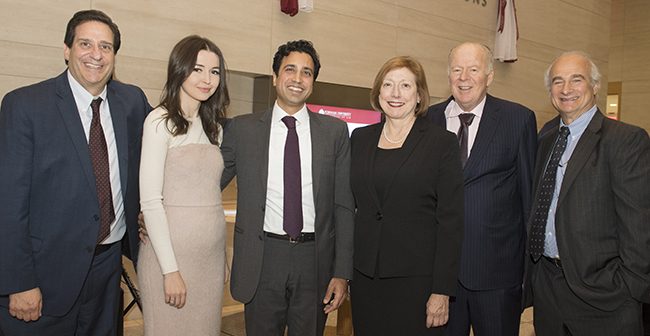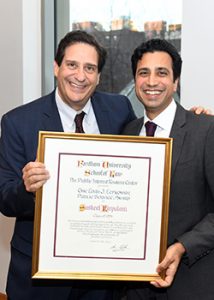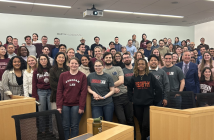On March 29, Fordham Law School dedicated the Kirpalani Commons in honor of Susheel Kirpalani ’94, founder and chair of Quinn Emanuel Urquhart & Sullivan LLP’s bankruptcy and restructuring group.
The School also recognized Kirpalani with a 2017 Louis J. Lefkowitz Public Service Award. Both honors celebrate Kirpalani’s generosity in funding programs that support the School’s students interested in pursuing public interest law. Through a leadership gift and significant bequest, he established the Kirpalani Scholars program, which provides full annual scholarships for four students, and he also underwrites summer fellowships for students through the School’s Public Interest Resource Center.
As the gateway to the Fordham Law School building, which opened in 2014, the Kirpalani Commons provides a gracious welcoming space for visitors and members of the Law School community. At the base of the building’s soaring two-story entryway, the Kirpalani Commons serves as both a student lounge and a showcase—through digital displays and display cases—for the School’s current events, its history, and the achievements of its faculty, students and alumni.
Present at the dedication were Quinn Emanuel Urquhart & Sullivan named partners Kathleen Sullivan and Bill Urquhart ’78, as well as partners Peter Calamari ’73, Benjamin Finestone, James Tecce, and Richard Werder.
“Susheel Kirpalani has made a philanthropic investment in Fordham Law students that will make a difference in not only their lives and careers, but also in the lives and futures of the people they help through public interest legal work,” said Fordham Law Dean Matthew Diller.
Though Kirpalani has found resounding success in his career—working on high-profile bankruptcy cases involving Enron, Lehman Brothers, and the City of Detroit—he says that his own consideration of public service work after law school was curtailed by practical realities.
“Unfortunately public service work was not something that I was able to do with my education given my financial situation,” Kirpalani says. “However, now I can use my resources to help other students pursue public service careers, and that’s something I want to make happen.”
He sees his contributions to Fordham as a way to further his interest in the public good, while also helping ensure the School’s future.
“If I give a dollar to a person who is going to work their entire life for such causes, how many people are there in their life that they’re going to help and that they’re going to impact?” he says. “It’s a great way to leverage your money for the greater good.”




